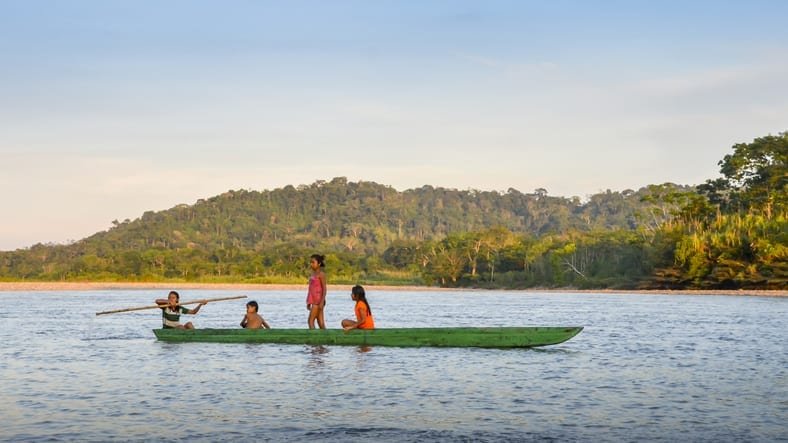The Amazon Sacred Headwaters
The Amazon Sacred Headwaters is one of the most biodiverse ecosystems on the planet and helps regulate essential planetary ecosystem services such as the hydrologic and carbon cycles.
The region is home to more than 500,000 Indigenous peoples from over 20 nationalities, including peoples living in voluntary isolation on their ancestral lands.
New and ongoing oil extraction in the region is a gateway to deforestation and contributes to violations of Indigenous people’s rights.
Indigenous leaders in the region have repeatedly voiced their opposition to the expansion of the oil industry and other industrial activities in their territories.
‘I wonder if the executives of banks in Europe know the real cost of their financing. How can they possibly sleep peacefully knowing their money leaves thousands of Indigenous peoples and communities without water, without food, and in devastating health conditions due to the pollution of the Coca and Napo rivers?
‘It’s time for the banks, companies, and consumers of the oil extracted in the Ecuadorian Amazon to acknowledge how their businesses affect our territories and way of life.’
MARLON VARGAS
President of the Confederation of Indigenous Nationalities of the Ecuadorian Amazon (CONFENIAE)
A toxic legacy
Some impacts of the oil industry on the region include the recent oil spill in Ecuador, ongoing oil spills in Peru, and the toxic legacy of activities by Chevron in the region.
In Ecuador, 120,000 people living in regions near the rivers, including 27,000 Indigenous peoples, have been impacted by the recent oil spill and related floods.
These communities lost their freshwater, livestock and produce, and some have documented skin diseases caused by crude oil from swimming in the rivers before they knew about the spill.
All of these impacts are happening in the context of the Covid-19 pandemic, where the communities can no longer take sanitary precautions.
‘The oil industry has a toxic legacy in the Amazon, further exacerbated by recent spills that have contaminated rivers and disrupted the health and food security of Indigenous communities.
‘Even during the Covid-19 pandemic, oil companies continue to pursue expansion, putting Indigenous peoples at even greater risk.
‘These banks cannot claim to uphold their own pledges on climate and human rights while they continue to finance the trade of Amazon oil.’
MOIRA BIRSS
Climate and finance director, Amazon Watch
Banks respond to the report
Several banks named in the report responded to Stand and Amazon Watch and expressed interest in addressing the issues raised in the report. To date, no banks have updated their policies.
Rabobank said it no longer finances trades from the Amazon Sacred Headwaters region, but it has not committed to updating its policy.
Natixis pledged to engage with stakeholders like Stand.earth and Amazon Watch in order to update its policy.
UBS and ING Belgium pledged to engage with stakeholders without committing to update their policies.
Credit Suisse acknowledged the importance of the report’s findings but evaded responsibility by saying its policies only apply to project financing.
BNP Paribas (Suisse) SA and Deutsche Bank did not respond.
 Play Video about This Rock Might Just Save The World
Play Video about This Rock Might Just Save The World Play Video about Play 2 hours of rock
Play Video about Play 2 hours of rock Play Video about Play 2 hours of brook
Play Video about Play 2 hours of brook Play Video about Play 2 hours of sheep
Play Video about Play 2 hours of sheep















































